Giant chainsaws and tiny black holes are just two things that can kill you in Half Dead
If you've seen the sci-fi horror movie Cube, you know what this game is all about.

I've died a lot today! A giant with dual chainsaws has buzzed me to bits, I've been sliced up by a wall of lasers, I've died of poison gas, rotating blades, explosions, and I've even been sucked into a miniature black hole. Half Dead is a first-person multiplayer action game in which you're taking part in a violent, futuristic television show, and your chances of surviving until episode two ain't great.
You and a handful of other multiplayer contestants begin in a square room with a door in each wall. Each door opens into another square room. The goal is to escape, but the problem is that nearly all of the rooms are filled with horrible, life-ending, body-splattering traps. If you've ever seen the 1997 sci-fi horror film Cube, you know exactly what this game is all about. If you haven't seen Cube, you should: it's got some enjoyably bad community theater-quality acting and one of the most memorable pre-title sequences in movie history.
Half Dead even borrows Cube's trap test. You're wearing two boots, and after opening a door to a new room, you can throw your boot in ahead of you, as I do in the above gif. This will set off any pressure plates or motion sensors, though there's a chance you may lose your boot—some of the traps will destroy it—and there's also chance the trap simply isn't activated by pressure plates of motion sensors. So, the boot doesn't always work, and you can quickly run out of boots even when it does work.
Another wrinkle: sometimes traps don't stay in the room they belong to. Sometimes they come running right through the door at you:
Since boots are limited, it's helpful to work together with the other multiplayer contestants. I'm speaking purely theoretically, of course: in the games I played none of my fellow guinea pigs were particularly interested in working together, choosing instead to race off in different directions, opening different doors, and quickly dying in different ways. It's grimly entertaining that, even through Half Dead's thick metal walls, you can hear your wayward partners coming to a grisly end.
I did try to follow someone on a few occasions, figuring at the very least I could work with them even if they didn't want to work with me. It seemed like a good plan, letting some foolhardy dope rush ahead of me and set off any traps, but some traps are more patient than others. Such as the tiny black hole that appeared after we'd already been in its room for a while. We were both drawn into its gravity well despite trying to flee:
This simply isn't a game to tackle solo (though there is a single-player option). You need other players, and their boots, because eventually you'll stumble into a room that is simply escape proof. Such as below, where the laser grid blocked the doors and the room filled with gas. No matter how cautious you are, you're not gonna outwit a lungful of smog. A boot would have set off the lasers, but he'd run out of them.
The biggest gaming news, reviews and hardware deals
Keep up to date with the most important stories and the best deals, as picked by the PC Gamer team.
And, sometimes you just run out of luck. While not every room has a trap in it—when you enter a safe room, it's marked on your minimap—sometimes you just try to flee from a giant chainsaw monster and run through a door right into a supernatural walking poison skeleton that makes you explode. Hey, no one said being on TV was a picnic.
I've had fun in the few hours I've played Half Dead, though it would definitely be better with friends or at least co-op partners who want to work together, and I'm not sure once you've seen all the traps a few times how much longevity the game really has.
On the other hand, it's under two bucks on Steam, plus it may be the only chance you'll get to play a new game with the word 'Half' in the title for the foreseeable future.

Chris started playing PC games in the 1980s, started writing about them in the early 2000s, and (finally) started getting paid to write about them in the late 2000s. Following a few years as a regular freelancer, PC Gamer hired him in 2014, probably so he'd stop emailing them asking for more work. Chris has a love-hate relationship with survival games and an unhealthy fascination with the inner lives of NPCs. He's also a fan of offbeat simulation games, mods, and ignoring storylines in RPGs so he can make up his own.

